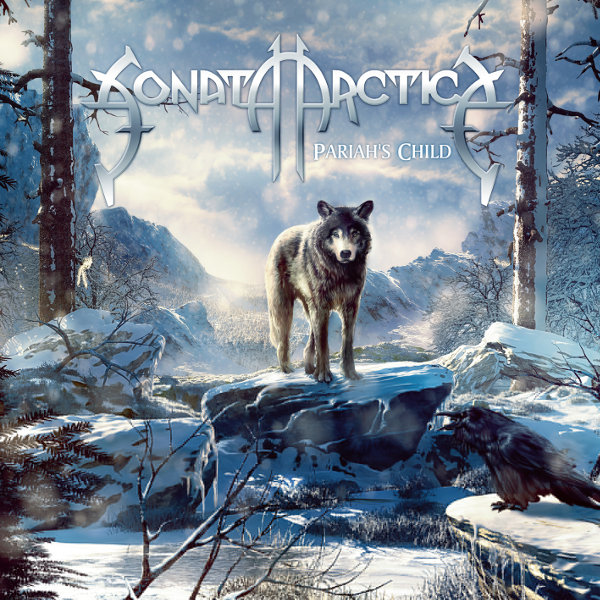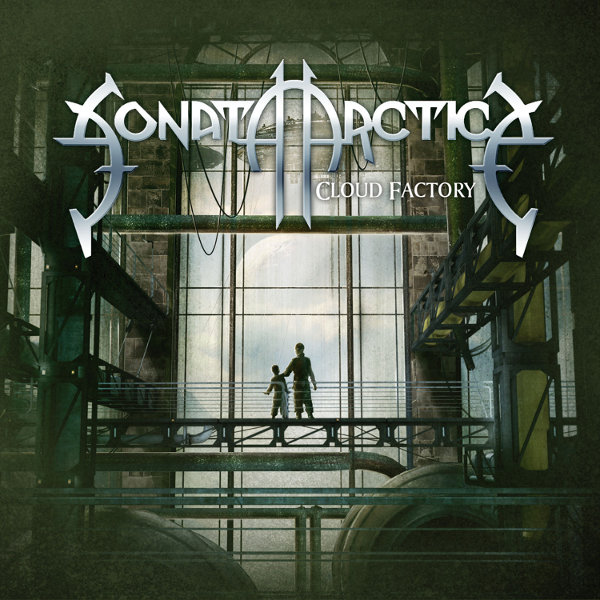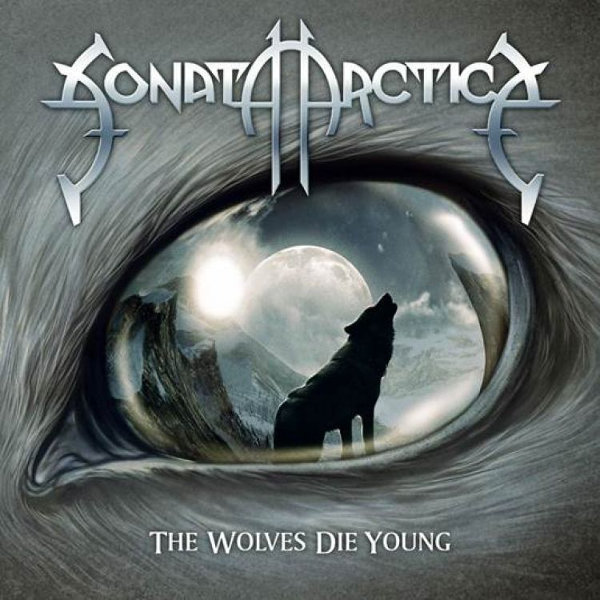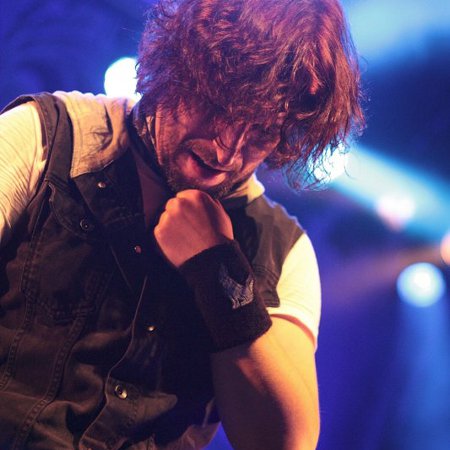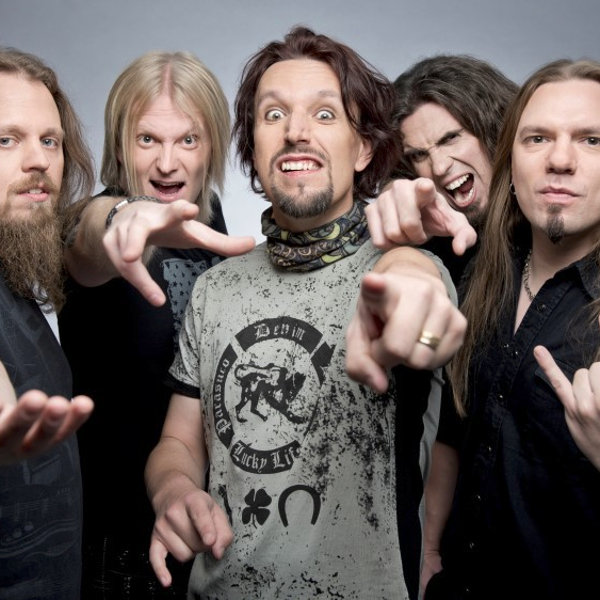Elise: There is a debate over the fact that this album is said to bring back the "old" Sonata. We've been listing to the album for some time now and I personally think that it's just a continuity of the last 4 albums. They all have little bits of the "old" Sonata but in a more complex form, the songs are more intricate. However, it is true that most of the songs on this album are very fast and upbeat. With hindsight and now that you've been working on the live shows, what can you tell the people who are anxious to know about "Pariah's Child"?
Tony: In my opinion, "Pariah's Child" is going back to the roots in a way that it's continuing the road we were on with the four first albums. It could have been Sonata Arctica's fifth album, had things gone slightly different back in the day. On the other hand, although I've probably said the same thing about "Stones Grow Her Name", this album is a slice of everything we've done in our carrier. On the previous album, it was bullshit. That was a rock album than anything else and now we really do have everything we've done in the past: we have really speedy shit and the rocking side as well. But then again, when you look at "Reckoning Night", it already was a little more versatile and experimental but not to an extent "Unia" was because that was the huge change of direction. We took one path there and stayed on it for three albums. I'm actually glad that we decided to change the logo at that point because those three albums were so distinctly different from what we had done in the past. And now that "Pariah's Child" is definitely more power metal than anything we've done since "Reckoning Night", I think it was in order to take all those trademarks back, like the old logo. I would call this an alternative version of Sonata Arctica's fifth album, going in a different direction from that intersection in time.
On this album, there are a few songs that stand out : "Half A Marathon Man" and "X Marks The Spot" sound very "Rock'n Roll", like you said earlier, and they made us think of "Shitload Of Money" on the previous album. Can you tell us a little more about them?
I started to write "Half A Marathon Man" in the middle of our rehearsal sessions, one morning at home. Every day, we went in the camp to rehearse and practice and rearrange the songs, then sleep home, and then go back. One morning, I started to write that song, and it took me two or three hours. Later that night, we had a sauna party at my place and I played the demo to the guys. They loved it, especially the chorus which is quite catchy. The next morning, only 24 hours after I had written it, we had already played it with the band and decided that it was going to be on the album because it had a special mood. That's the funny story behind that. "X Marks The Spot" was maybe the hardest to write. I must have written it again twice at least while we were rehearsing it. I brought the first demo to the guys and we rehearsed it. I wasn't pretty happy with it at all, it had a lot of parts I didn't feel good with. I decided that we were not going to do the song. I went back home and after a few days, I came up with a different approach and finally had the last verse... The only thing that remained the same the whole time was the chorus and the riff part in the middle. It was there all the time but I wrote the rest completely again. It took me a lot of work. Lyric wise, "Half A Marathon Man" practically wrote itself on that demo because it had that one line: "Half A Marathon Man". (laughs) I started to run last summer and it just came to be that way. I decided that I was going to keep that stupid line and write a song around it. "X Marks The Spot" had quite a few different stories going at some point. Finally I came up with this repeating phrase "X Marks The Spot". It's about what you want to fill the blank with. I decided to throw rocks at those people who blindly give their lives away to religion or other weird organizations like cults. They really give away their freedom of thoughts and go the wrong direction. I had one friend in time who was that way. It pissed me off, it's a waste of good human. It's unfortunate, but the song is really fun and tongue-in-cheek and I love what Elias' friend, Jaakko Koskiniemi, is doing with this preacher character that we have there. We made a great script for the guy and it was a lot of fun. He's got this great accent, he's been living in the USA for more than 10 years. Maybe we have to ask some real Americans what it sounds like but for us it sounds like the real deal. (laughs)
"Take One Breath" has a peculiar tempo which gives a strange mood to the song. Was it an effect you intended and how is that mood also conveyed by the lyrics?
One of the reasons why that song is slightly different from anything else is that I had originally written it to be on my solo album – like many other songs. (laughs) On the previous album, it was "Somewhere Close To You" that was supposed to be on my solo album. One by one, Sonata Arctica is stealing first my time and then my songs. (laughs) For this one I thought it could actually be on a Sonata Arctica album if we changed it a little bit. It wasn't a big change but we had to make it simpler because it was even more complex, originally. I think the lyrics was one of the more demanding jobs. I had to study quite a bit and learn about French Humanism. It came out pretty okay, I'm happy with it.
"Love" is the only ballad on the album. Did you have other ballads on the demo phase or was it always just the one?
I must have more than 10 ballads in my drawer. (laughs) Last summer, when I was working on this album already, I went through all the ideas and songs that I had on my computer and on paper and I came up with a title for each one. I think the final count was 60. I have almost 60 songs in reserve. I call it my parachute. (laughs) If I need a song and nothing comes up I can go and take something from there. "Love" is one of those songs. I had quite a few other ballads hanging there on the list. At the point when we decided to go more "rock" and "speed" direction with this album we thought "all this soft shit has to go". They will eventually find a home somewhere, I'm sure. Usually, the ballads are given away to other artists. I'm often asked to write ballads. I never do but since I do have a lot of them at the moment so it might be a nice thing to eventually give all the songs a life.
Talking about life, I wanted to talk about "Larger Than Life". It is not the first time that you have a very long song or a song that has different parts but can you tell us about that one? I was also wondering if it was particularly important for you to tackle the subject of fame.
The songwriting process came really spontaneously : I started to fool around with orchestral sounds and I enjoyed it. All of a sudden I had quite a few different parts which, later on, became "Larger Than Life". I named it that early on because it sounded really big. I knew it wasn't going to be a two minute and a half punk rock song. That name "Larger Than Life" inspired me a spark, some kind of need to write a story that could be larger than life. It came one section at a time and slowly I realized what kind of an arch this whole song should have. It would be the whole life of this young man who gets a big role as an actor, gets famous, travels the world, gets rich….And suddenly he realizes that he's an old man already, he's got everything he ever hoped for except for someone to share that with. He doesn't have a family, all his friends have kids and he has nothing. He then realizes that it is still time to find something meaningful in his life. He finds love and he is able to build himself new meaningful golden moments of life. It's a fairly happy song, a really "larger than life" song. It has a moral: never give up, it's never too late, reach for your happiness.
This song made us think a little about Nightwish, to be honest. The orchestra elements and the second part with your vocals made us think about Scaretale. I hope you take it as a compliment…
(laughs) Yeah, of course! Absolutely!
Your next single is "Cloud Factory". You usually say that, when composing a song, the music comes first and then you add lyrics. Was it intentional on that one to write rather dark and serious lyrics on such a light music? Because it really sounds happy when you don't listen to the lyrics…
(laughs) You know, in the early days, Sonata Arctica was called "happy metal" and I wondered what the fuck it was all about because all the lyrics was really gloomy and dark. (laughs) We rarely had anything happy to say about anything. Obviously those people who called us that had not paid attention to the lyrics. It's been always like that : I do not find happiness and light things really inspiring. There needs to be some kind of huge drama and melancholy about it. In some weird way, I suppose I understand that suffering makes greater art. (laughs) I actually can't even remember when I wrote the lyrics for "Cloud Factory". I played it to the guys on the demo sessions of the "Stones Grow Her Name" album. So it must be almost five years old because, already then, it was an old song for me. I knew the song was going to be about children getting stuck in that same town and factory where their fathers and grand-fathers got stuck too because it's a safe and, in a way, a happy place to be. The factory offers them livelihood and some form of happiness but they are stuck there nonetheless and they are slaves to their town. They never get to see the world and search for their true happiness from anywhere else but that tiny village or that one factory everybody goes to and their children will also go to. That's the idea behind the song. It sounds like Bruce Springsteen. (laughs)
In "Cloud Factory" and "What Did You Do In The War, Dad?", there is this father-and-son relationship and this idea of heritage that was also on the previous album. Is the title "Pariah's Child" about that as well?
No, not at all. I had to come up with a title because we already had the cover. We were in the studio at the time and I had stayed awake all night just to search the internet and find inspiration for the title. I've always liked those words "Pariah" and "child", they feel really cool. I just had to find a way to explain it, first to myself and to anybody including you. (laughs) We abandoned our totem, the wolf, especially with the previous album since "Stones Grow Her Name" didn't have any wolves. Already with "Unia" we had abandoned that old Sonata Arctica thing which once made us. That wolf had become a pariah. We hated it even at some point because it started to feel like a burden, although it has saved me many times from the blank page. When I can't come up with anything I can always start writing about something wolfish. (laughs) This album is, in a way, a child of that once abandoned wolf, that pariah.
You've used quite a few sound effects and atmosphere sounds on this album: the wolf, of course, the factory sounds, the runner's steps. Where does that come from?
Literally, they are the sounds of our daily life since the wolf is partly Hendrik's dog. (laughs) On "Half A Marathon Man" it's me jogging. We recorded stuff on our own. I just wanted some kind of bridge between the songs to create scenery and take people to a new environment. When you go from "Cloud Factory" to "Blood", for example, I didn't want people to still think that they were in a factory when "Blood" started because it would give them the wrong idea. So you go from the factory and suddenly you are in the nature with wolf thanks to that melancholic intro and wolves hauling. I enjoy those a lot. They do serve a purpose in live situation as well : it's the moment when I can go and have a drink. (laughs) Usually I'm just talking all the time and never get a break. So those will give me a 10 second breather.
On "Half A Marathon Man", we can clearly hear the "70s rock" style and on "Larger Than Life", apart from Nightwish, it makes us think of Moulin Rouge. Do you have albums or movies that you like to watch or listen to while you compose?
Sometimes. When I see a movie, I sometimes think that it could work as an aid to write music but I've never gone there. The only time that I wrote lyrics watching a movie was for "The Ruins Of My Life" : I took a lot of inspiration from Braveheart. There is a movie about wolves which is really beautiful and I meant to write a 4 or 5 minute soundtrack for it but I forgot to actually buy the bluray. (laughs) It's a really good method of writing but I just don't use it as much as I should.
Let's talk about videos, now. You already shot "The Wolves Die Young". What is your interpretation of it?
I think it came out really okay considering the resources we had. (laughs) We had Patric Ullaeus as a producer , he's really good so we let him free to do whatever he felt like doing, although we told him we wanted it to be some kind of adaptation of the lyrics. We did our part, we shot in Lahti, Finland. It took 2 or 3 hours then Patric took care of everything else in Sweden so we didn't get to see the magic. (laughs) For us it was funny to see the final version because we didn't know about it. We are happy with the results. I haven't seen any comments from people, I hope they like it. I don't really go online and check people's comment about anything because it usually doesn't make me happy. I get upset when people say something bad and I get upset when people say something good too, which is weird. (laughs) If someone understood something wrong, even if it's in a good way, it is frustrating. Consequently, I do not go there anymore. (laughs)
Have you shot a video for "Cloud Factory"?
No but we shot one for "Love" which will probably come out at the same time as the album is released, in March.
You've started the live shows in Finland. How did it go?
It was fantastic! First shows for Pasi and he already has a bass solo. (laughs) We play "The Wolves Die Young" as a show opener and he's playing a solo before I open my mouth! It's pretty impressive, it's a technical thing to do. Not all the bass players can do that. He's been really welcomed in the band. I think that shuts a lot of mouths. If there are some people who cried for Marko I think they'll close their pie hole after that solo and enjoy the show. We've been playing a lot of the older stuff like "Kingdom For A Heart", "Wolf & Raven", "The Cage" a lot of the songs that we haven't played in a long while. It's been a lot of fun. The shows are physically demanding, I feel like a young man. (laughs) Back then, all the shows were really draining. I felt like I was going to die after every show. I'm in a much better shape than I was 10 years ago. Still, I do feel beat and drained after every show but I suppose it's only because I'm older. Our shows are almost half an hour longer than the ones we had back in the early days.
In 2014, you will celebrate the 15th anniversary of "Ecliptica" and of your career. Have you planned something special? You've talked about a documentary at some point, is that still happening?
Yes, and there might be one or two other things as well. We are re-recording "Ecliptica" this year by the request of our label in Japan. That's actually one of the things that contributed in us going on the direction that we are on right now. Listening to the old songs last summer, as well, to get the setlist ready. All those things combined make things happen. I think the best way to celebrate 15 years is to play these songs live everywhere and have fun and bring joy to people. There's going to be a Sonata Arctica book at some point, hopefully this year. Of course it's a big thing but, I don't know, we'll see. We should come up with something even more special I think. I'm not sure if we have time because I we have at least a hundred shows this year so it's going to be tough.
We've met Tuomas a few weeks ago to talk about his solo album "Music Inspired By The Life And Times Of Scrooge". He told us that you actually are a bigger fan of Don Rosa than he is and that it's one of the reasons why he asked you to be part of the album. Can you tell us about the first time he told you about this project?
That must have been a couple of years ago but I think it was more of a dream. He was talking about a solo album in the same way that I've been talking about my solo album for 14 years now. (laughs) He said that he would love to make a soundtrack for "The Life And Times of Scrooge". I thought it was an "out of this world" kind of idea and he would be the one man who could actually make it in a way that it would respect and be worth the art on the book. When I heard that he was actually making it happen for real I was impressed. I might have actually been upset if he didn't ask me to be part of it (laughs), and sure enough he did, so it was perfect. I'm doing this one song ("Cold Heart of a Klondike") and it was a fantastic treat. Me and my family all went to the Petrax Studios in southern Finland, in Hollola, on this short vacation and one day we recorded my parts. It was enjoyable working on that album. It had a special feeling realizing that the day was going to end in some kind of a party because Don Rosa was joining us there that night. But there was going to be a lot of media so I decided to evacuate my family away from the studio. You know how hard and painful it was leaving literally 15 minutes or half an hour before Don Rosa arrived?! It was the right thing to do. I'll get to meet him at some point again. I've seen him actually, I once drove 200 kilometers to get all my books signed. (laughs) I'm a fan. (laughs)
How do you like the album as a whole?
I've heard it only once but it sounded fantastic. I think the moment when it serves the purpose the best and, for me, brings the most joy is when you open the book "Life And Times Of Scrooge McDuck" and listen to the album at the same time. That's when all the hair on me rises to the sky. It's a beautiful album, it's an adventure. But I urge everyone to read the book as well. It's what inspired Tuomas to write all this beautiful songs.
Nightwish announced that Troy Donockley and Floor Jansen were now officially part of the band. What do you think about that decision and have you met any of them?
Yes, I've met Troy before, he's great and a fun magician. (laughs) I've met Floor briefly years back but I know her as a singer so I was so happy when I heard that she was going to join the band. I was like "Yes! Yes! Yes! Now this band is complete. Finally, they have a terrific singer". They've always had good singers but now… You know, she's a tall girl, she fills the stage with her presence. It's just perfect. I've seen her live once in Wacken Open Air with Nightwish, it was really impressive. And of course you get to see that on DVD as well but seeing her live was something special. That band is full of surprises! Taking one extra member, that was something I did not see happening, but that's perfect, he really fits in.
■


 Vous pouvez également lire notre interview en français
Vous pouvez également lire notre interview en français